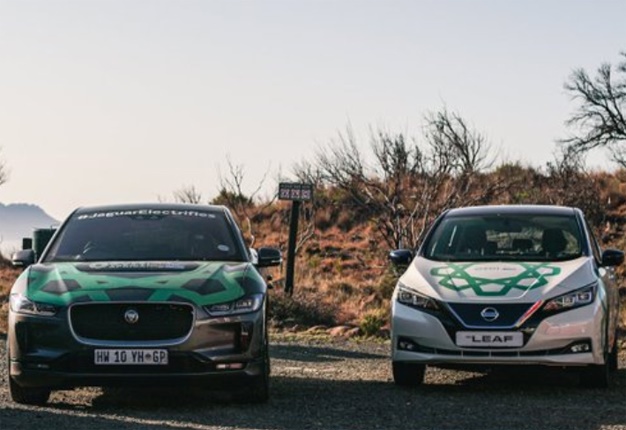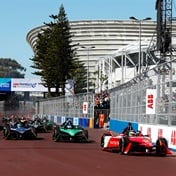
Port Elizabeth – After travelling over 1200 km from Pretoria to the Windy City in the Eastern Cape the EVRT Africa 2019, the first official electric vehicle road trip in South Africa, has reached the halfway point on its intrepid journey towards Cape Town.
Powered by ACDC Dynamics and driven by Generation.e in partnership with the Department of Transport, the Gauteng Provincial Government and the African Alliance for Energy Productivity, the EVRT Africa participants will depart Port Elizabeth today on a route over Knysna and Worcester towards Cape Town to prove it is possible to drive across the country without a single drop of petrol.
Pioneering trip
The pioneering trip, conceived to increase public awareness and education of electric vehicles to inspire the shift towards smarter mobility, will end in Cape Town on 9 October with the grand finale at the Silo District at V&A Waterfront on 10 October.
While many challenges, such as vast distances, lack of charging infrastructure and prohibitively high purchase prices continue to stifle the adoption of electric cars in South Africa the wheel is slowly turning with rapid technological developments in terms of fast charging, range, and electric vehicle design.
Fuel prices reaching historical record highs can also drive the demand for electric cars in the medium to long term, and besides EVs such as the BMW i3, Jaguar I-Pace and Nissan Leaf already available and the arrival of more new models, including the Mercedes-Benz EQC, Audi e-tron, Volkswagen ID.3 and BMW iX3, can also contribute to shifting public perception towards electric mobility.
The vehicles
The trip is also unique in the sense that three vehicle companies – Nissan, BMW and Jaguar Land Rover (JLR) – collaborated with the organisers and other partners to make it a reality, and while Mercedes-Benz apparently wanted to partake with its new EQC (first shown at the Smarter Mobility Africa exhibition earlier in September) the vehicles could not be released in time for the trip.
While not yet officially launched in South Africa, Nissan made two new Nissan Leaf vehicles available for the event. The new Leaf e+ features Nissan’s newly developed 40kWh battery pack, giving it increased range and power, as well as standard ProPILOT advanced driving assistance technology and e-Brake energy regeneration technology.
Its power unit now delivers 110kW and 320Nm of torque, giving it a top speed of 144km/h and a 0-100km/h time of 7.9 seconds. According to Nissan the range of the new e+ has been increased to 260 km but, as we experienced, this is not easily achievable…
BMW has made available its new i3s model with uprated electric motor now delivering 135 kW of power and 270 Nm of torque and this means the i3s can accelerate from 0 to 100 km/h in only 6.9 seconds and reach a (limited) top speed of 160 km/h. Priced at R716 900 without any options, the i3s has a range of 270 km (without range extender) at an average power consumption rate of 14-14.6 kWh/100km.
The I-Pace arrived in South Africa earlier this year and is powered by electric motors driving the front and rear axles with total outputs of 294kW and 696Nm. This means the I-Pace is brisk; completing the 0-100km/h sprint in just 4.8 seconds.
Jaguar claims a range of about 470km for the I-Pace at an average power consumption rate of 22kWh – making it a very feasible long-distance cruiser – but it is expensive, currently retailing from R1 672 230.
In terms of the EVRT event, distances between stops were dictated by the vehicles with the lowest range capability – the Nissan Leafs – but as it turned out it wasn’t really the short distances that were the most frustrating aspect of the journey; more so the time wasted while waiting for the vehicles to be recharged…
Range anxiety is real
What else have we learned thus far? Well, range anxiety is real. Very real,It is disconcerting when you find yourself in the middle of nowhere with over 150 km to go before reaching the next charging station, and the range indicated is 10-20 km short of your goal…
The problem is that range is continuously calculated – taking your current energy usage into account – while not always accurately compensating for changes in topography or road conditions that promote better energy usage. Many a time we overcompensated due to range anxiety, only to reach our destination with 50-60 km still to spare…
Take it easy, very easy
That said, you need to take it easy, very easy to ensure you reach your destination. You see, EVs (at least currently) are engineered to be most efficient when doing around 90 km/h. On the open road, with a speed limit of 120 km/h, this feels dead slow, and the temptation to push on is always there,
However, even when you have enough battery power left to do so, remember; the more battery power consumed, the longer the recharging will take… so whatever you have gained by getting there faster is negated by the time it takes to recharge the battery.
Grid gremlins
As mentioned, the most frustrating aspect of the journey is the time wasted while waiting for the vehicles to be charged. This is not so much due to limitations of the charging stations wherever they are situated but more by stability problems with the power supply from the national electricity grid.
This leads to power outages, or in one case (at Wolwefontein) to a too high current being fed into the power supply; leading to the charging stations tripping as a safety precaution. However, one will assume this will be fixed as soon as consumer demand picks up.
While electric vehicle charging stations are still limited in scope (with only 120 publicly accessible charging stations primarily located in the Gauteng province), new charging stations are now being launched virtually every week by companies such as ACDC Dynamics.
Another example is the R30-million investment by Jaguar (in partnership with GridCars) to install 82 new charging stations in major hubs and along major holiday routes across South Africa. Still, much needs to be done.
A new mindset
With all the challenges still facing EV road trippers, it is clear one needs to have a different mindset when planning such a journey. One must not be time-constrained, otherwise, the experience will be hugely frustrating. Rather take it easy and enjoy the open countryside with its spectacular vistas.
Also, make sure there is a wide choice of music and other forms of entertainment available or visit the local shops and attractions to kill time while the vehicle is being replenished.
For more information or the latest updates on the EVRT, visit the website, or follow @EVRTAfrica2019 or #EVRTAfrica2019.




 Publications
Publications
 Partners
Partners















